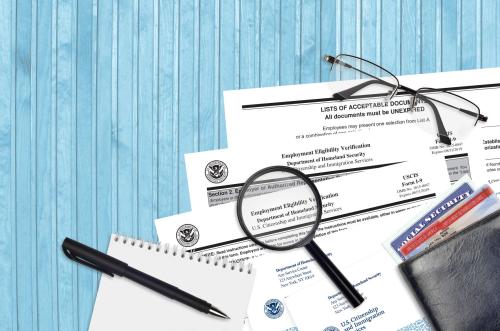This case study is part of the Spotlight on Local Recovery Efforts series, a feature of the COVID-19 Metro Recovery Watch.
Summary
When pandemic-related lockdowns began in March 2020, many workers experienced a rapid and unexpected decrease in earnings, but still needed to make ends meet. JobGet, a Boston-based hiring app, saw an immediate surge, with an increase of 25,000 in the number of users and a 20% increase in traffic overall. In April, they announced a partnership with the career centers of MassHire Central Region Workforce Board (MCRWB), to help a growing number of unemployed job seekers quickly secure employment through the app. Although JobGet currently focuses mainly on hourly jobs, the platform itself has proved to be a valuable tool for providing remote access to job listings in a way that is accessible from a mobile phone.
Publicly funded state labor exchange platforms available through the American Job Centers network are frequently based on outdated technologies and have a limited range of listings and functionality for users compared to private websites such as Indeed or LinkedIn. Those private websites also tend to focus largely on white-collar jobs that require a college degree or more. Given that some low-wage workers do not have access to the internet or a computer during the pandemic because public online access points have closed down, mobile platforms that are designed with the job seeker who has less than a bachelor’s degree as the target audience—such as JobGet—represent a promising model to expand over the next two years as pandemic-related economic uncertainty persists. However, these platforms have a limited range of job postings, and workforce development boards like MCRWB should consider how to increase the focus on quality jobs and jobs with potential for career advancement while utilizing such a tool in the near and longer term.
Execution
Designed to make the job search process instant, accessible, and efficient for hourly workers in the retail, hospitality, and restaurant industries, co-founders Tony Liu, Peter Lee, and Billy Lan launched JobGet in 2018. Because of its effectiveness, JobGet has partnered with the MCRWB career centers located in Worcester and Southbridge to address labor market needs during the COVID-19 pandemic.
The partnership was established in response to the COVID-19 unemployment crisis, and it has made MCRWB one of the few local workforce development boards to utilize mobile app technology for labor market exchanges. MCRWB and JobGet collaborated to conduct a unified marketing push for job seekers to sign up for the app. MCRWB sent emails to their distribution list and employers in their network, and JobGet trained them to teach users to sign up. JobGet is incentivizing employers to use its platform for hiring needs by making it available to them for free for six months. During the initial push, MCRWB and JobGet offered gift cards to people who signed up to use the platform. JobGet also changed their user agreement so that when users sign up through a special link created just for MCRWB job seekers, their data is shared with the board and its career centers so they can track how their program participants are doing and offer further support.
Cost and timeframe
This initiative was a public-private partnership, and JobGet is a privately held company that is venture-backed. Typically, employers must pay to connect with potential employees on JobGet, which also provides a stream of income. Effective April 2020, JobGet is offering its service to employers for free over a six-month period, with the potential of extension based on the state of the pandemic and the commonwealth’s response. The partnership is of no cost to MCRWB.
Key components and features
JobGet is a mobile app that is free for job seekers and designed to quickly connect them with nearby hourly jobs, predominately in Massachusetts. Employers can hire new staff within 24 hours through instant messaging and phone/video interviews, allowing job seekers to not have to go weeks without pay during the job search process. In addition to being a resource that job seekers can rely on to find opportunities safely in the pandemic in the short term, the app also helped companies that desperately needed more workers to meet surges in demand during the pandemic, such as grocery chains, pharmacies, and warehouses.
JobGet allows users to quickly find new hourly work. Upon signing up, JobGet requires users to set up a profile, upload their resume, and set their location. From there, they can apply for jobs by simply clicking “Apply” under a job’s description, and their profile is shared with the employer. The app breaks out into the following separate tabs:
- Home: Users can search and filter open jobs by location, distance, category (industry), and availability. The previewed results clearly display the hourly wage and if experience is necessary.
- Recommended: The app lists open jobs that would best fit users based on their profile and settings.
- Messages: The app allows users to communicate via instant messaging with employers in this tab.
- Applications: The app tracks which jobs users applied for and the jobs that users were shortlisted for.
- Profile: The app allows users to update the profile settings as they wish.
Here is a screenshot:

Successes
Not everyone can afford to have a computer at home, and many people rely on computers at public libraries and career centers to apply for jobs and access information and services. These access points are typically closed to in-person visitors during the COVID-19 lockdown. A mobile hiring app such as JobGet provides an accessible solution for job seekers who do not have home internet access, given that mobile phones are more common. Its efficiency and accessibility allow JobGet to be successful in connecting thousands of job seekers to employers.
JobGet has received accolades for its app. In October 2019, the company won the Gold Award at the 2019 MassChallenge Awards, which came with a $50,000 cash prize to expand its business operations. JobGet also won the $250,000 Global Grand Prize in the MIT Inclusive Innovation Challenge in November 2019.
Considerations
Mobile platforms such as JobGet are a critical component for employment programs to include in a larger effort to pivot to remote service delivery over the next year. However, these mobile platforms should be expanded to offer connections to quality jobs, local reskilling and apprenticeship opportunities, professional networks, and remote jobs for the longer term as well. At the moment, JobGet and MCRWB do not sufficiently guarantee that job placement options include quality jobs with livable wages, worker protections, stable hours, and benefits such as health care. Many of the hourly wage jobs listed are occupations that potentially put workers at risk of being exposed to COVID-19 without hazard pay.
To be more inclusive, JobGet and MCRWB could work together to identify and connect job seekers to employers and opportunities that offer career pathways to quality jobs. An even bigger step would be a feature that allows job seekers with a criminal record to easily filter “second-chance” employers.
JobGet is currently planning to pilot a feature to provide career pathways to quality jobs, including partnerships with training and certification providers. They are also working to diversify the current job offerings to include more industries and verticals such as health care, office administrative, and clerical positions.
Tracking impact and outcomes has presented another challenge for JobGet and MCRWB. Once job seekers and employers have used the platform to get what they need, MCRWB has experienced difficulties in reaching them for follow-up services and to gather information about how to improve or offer additional services.
JobGet is highlighted here largely because it has helped MCRWB job centers transition to remote services easily by offering a tailored solution for low-wage workers at a time when these local centers were closed for in-person service. Ideally, a more long-term partnership between a job search app and the workforce system would also connect people to local training programs, supportive services such as child care, certifications, professional networking opportunities, apprenticeships, one-on-one career coaching services, and other services to increase economic opportunity and access to quality jobs for all.
Sources and additional resources
- JobGet: website
- MassHire Central Region Workforce Board: website
- Boston Business Journal: Boston startups that connect recently laid-off workers with gigs are surging
- The Boston Globe: A staggering 3.3 million people filed for unemployment as economic toll mounts
- Massachusetts governor press release: Baker-Polito administration announces emergency actions to address COVID-19
- MassHire Central Region Workforce Board press release: New partnership with JobGet
- JobGet press release: JobGet partners with MassHire Central
- JobGet Video: 2019 MIT Inclusive Innovation Challenge (IIC) global finalist
Do you have a similar solution in your area? Is there another problem that you’re tackling in an innovative way that you’d like to share with a wider audience? Contact us at [email protected].







